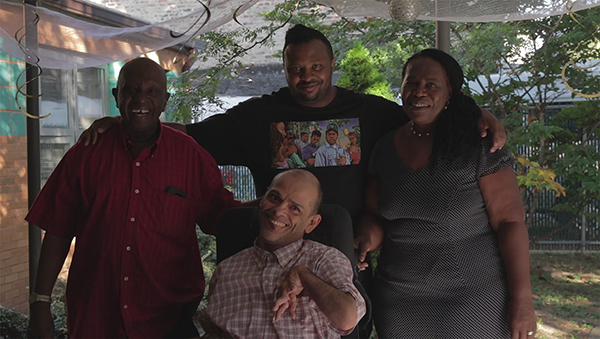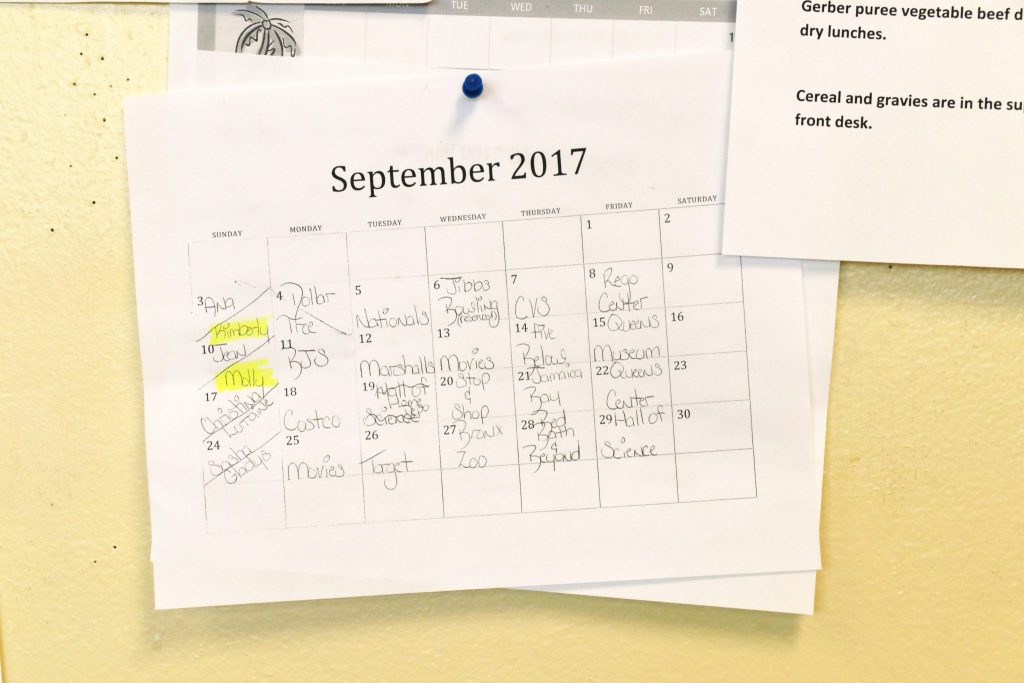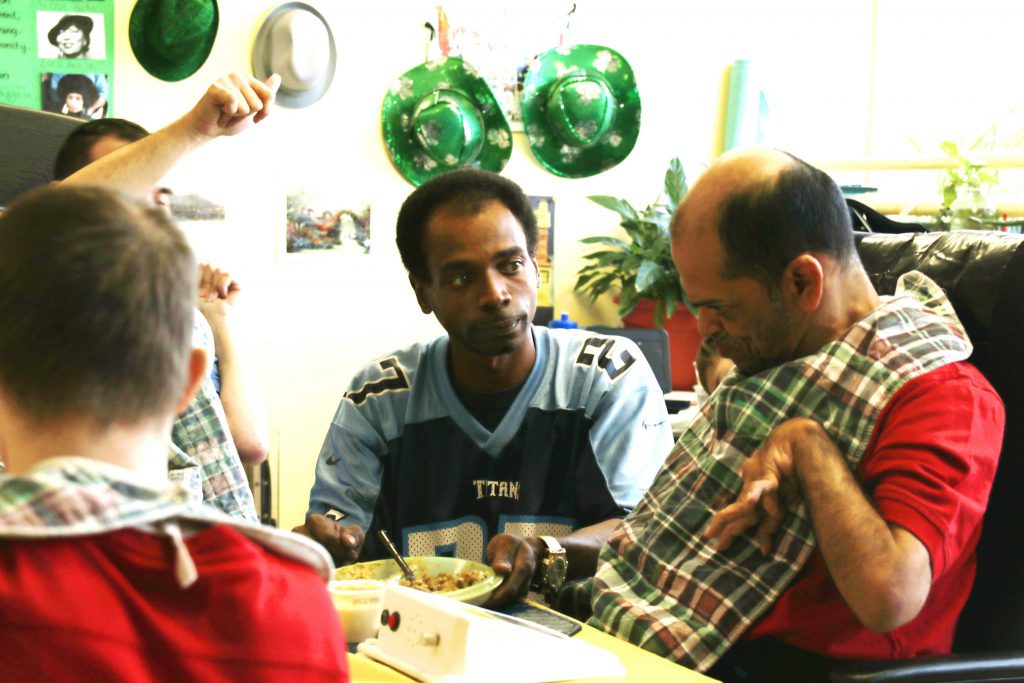News and Events
At HeartShare, we believe in keeping you aware of news and events throughout the agency. Be sure to visit our Events Calendar for important upcoming dates that may be of interest to you.
What does it mean to live with a severe developmental disability?
We decided to spend some time with David.
Someone who relies entirely on HeartShare staff for daily living.
These compassionate and patient caretakers are unsung heroes, facing some of the most difficult work within the agency.
When we talk about frontline workers holding the lives of others in their hands, this is it.
The men and women who live at HeartShare’s Sharkey I Residence in Maspeth, Queens are non-ambulatory, or use wheelchairs. Some are medically frail. Unable to leave home on a daily basis.
Some go out to attend their day habilitation program. Others for medical appointments and occasional family visits.

David with Assistant Residence Manager Eric Liverpool, Direct Support Professional Gilbert Fleming and Residence Manager Jacqueline Bristol at HeartShare’s Sharkey I Residence.
The day starts early. “Wake up time is around 6:30 a.m. Our DSPs make sure that each person is brought to the bathroom and changed. They are clean and ready to start the day,” said Assistant Manager Eric Liverpool. Those same DSPs make sure that everyone eats breakfast.
Although David needs this assistance to get ready, there are small, but meaningful opportunities for him to express himself.
“David will not leave (the house) without his watch or hat,” said Jacqueline Bristol, who manages Sharkey I and has known David since 1995. He was just a young man then.
Jackie proves that communication is possible no matter what the circumstances. She’s attuned to David, who is non-verbal. Jackie and her staff watch his body language and facial expressions. They notice when he is laughing—or groaning.
If David can’t speak, then what can he say?
“I will never forget when David refused to leave the house without his accessories,” recalled Jacqueline. “To this day, David expects staff to hold out his baseball caps in the morning. David will motion towards what he’s looking for.
“Someone like David has limited mobility. It is so important to offer him, however small, a sense of choice and control,” said Speech Pathologist Barbara Ornstein, who rotates across HeartShare programs.
After breakfast, residents are on the bus by 7:30 a.m. In wheelchairs, they are lifted up onto the bus.
They arrive at Hoffman Day Habilitation Program in Woodside.
The lift goes up and down.
Up and down.
One by one, Hoffman employees greet the individuals as they come off the bus and are escorted to an assigned room upstairs.
“Good morning!” says Kimberly cheerily, trying to get David to smile. Kimberly Samuels is one of the Senior DSPs at Hoffman.
Over 80 program participants come off of five buses from HeartShare’s Sharkey, Healy, Buckley and Cuite Residences. Some live at home with their families.
Each person is assigned to a room, where they engage in activities in smaller groups.
David starts the day with help from Reggie Twitty, another DSP. With a quiet and gentle demeanor, Reggie uses a swab to clean David’s teeth with mouthwash. David had his teeth brushed at home, but this is another round at a difficult task. Reggie shows David how to hold the swab and make the back-and-forth cleaning motion. Brushing your teeth is a part of ADL or Activities of Daily Living.

The Hoffman Day Habilitation Program team schedules activities and field trips to ensure that people like David are inclusive members of the Queens community.
There’s a full activity calendar on the wall. From Jamaica Bay Wildlife Refuge and Queens Museum to picking up items at Target, there’s a lot going on. “We can’t go very far simply because we need a place where we can change our program participants. There just aren’t public bathrooms accommodating those needs,” said Assistant Program Coordinator Vivian Romero-Gambrell.
Many of us forget what we have.
The ability to hop on a bus.
To just get up and use the bathroom.
“What about those using customized wheelchairs?” Vivian asks. One time, a group from Hoffman went out bowling and some wheelchairs couldn’t get through the door. “This city isn’t as accessible as we think. We’ve come very far. But not far enough,” Vivian said in an activist tone.
Despite all this, the Hoffman team forges forward. “We’re working with local businesses to repurpose floral arrangements, which we would then donate to senior centers,” she said. This teaches a skill and creates community.
Next up, our individuals start an art session. David reaches for red paint. Reggie guides his hand from the wet paint to the blank canvas in front of him. Soon, it’s time for lunch. Each program participant has unique dietary needs. It’s not just about limiting caloric intake or sodium levels.
It’s requirements that could prevent someone from choking.
“This is what our DSPs are required to know,” said Barbara Ornstein, pulling out a plastic placemat showing what quarter, half and one inch pieces of food look like.
Sometimes, individuals need to be fed. Some need adaptive technology. Weighted spoons help someone with tremors hold a utensil firmly. One young woman was unable to join in during lunch. She later visited the program nurse to eat her meal by feeding tube. A precaution to avoid choking hazards altogether.

HeartShare Direct Support Professional Reggie Twitty feeding David at lunchtime.
After lunch, the staff takes out an assortment of instruments. “This is a very sensory population,” said Molly Habib, a Senior DSP working at Hoffman for 17 years. “They like to feel stimulation and smell fragrances. It’s an enjoyable, receptive feeling,” she said. Each program participant, now with an instrument in hand, is pressing down on keys or plucking strings. They’re making music.
“We get stuck on language sometimes. The jargon,” said Vivian. “We are here to celebrate the people we serve. Why they’re special. What they have to offer.”
The program hosts a parade to do that. Each month, someone is recognized.
That person wears a sash and leads the procession.
“A person without words still knows what it feels like to be left out. Human beings know when they are excluded and when they belong,” said Vivian.
“David doesn’t let anything stop him,” said Jackie. “He will sign. He will look you right in the eyes. He will let you know.”
Jackie paused thoughtfully and smiled.
“That’s my David.”
Share
Website Footer
 Donate
Donate
Sign up for our newsletter

Click this logo to support HeartShare every time you shop at Amazon. For all eligible purchases, the AmazonSmile program donates 0.5 percent of the price to HeartShare.
Website by Manoverboard Inc.

